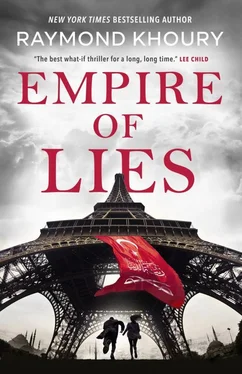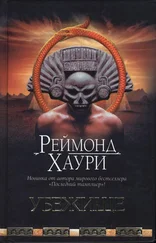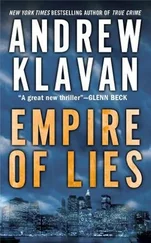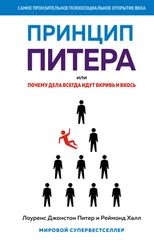Реймонд Хаури - Empire of Lies
Здесь есть возможность читать онлайн «Реймонд Хаури - Empire of Lies» весь текст электронной книги совершенно бесплатно (целиком полную версию без сокращений). В некоторых случаях можно слушать аудио, скачать через торрент в формате fb2 и присутствует краткое содержание. Город: New York, Год выпуска: 2019, ISBN: 2019, Издательство: Forge Books, Жанр: Альтернативная история, Триллер, на английском языке. Описание произведения, (предисловие) а так же отзывы посетителей доступны на портале библиотеки ЛибКат.
- Название:Empire of Lies
- Автор:
- Издательство:Forge Books
- Жанр:
- Год:2019
- Город:New York
- ISBN:978-1-250-21096-8
- Рейтинг книги:3 / 5. Голосов: 1
-
Избранное:Добавить в избранное
- Отзывы:
-
Ваша оценка:
- 60
- 1
- 2
- 3
- 4
- 5
Empire of Lies: краткое содержание, описание и аннотация
Предлагаем к чтению аннотацию, описание, краткое содержание или предисловие (зависит от того, что написал сам автор книги «Empire of Lies»). Если вы не нашли необходимую информацию о книге — напишите в комментариях, мы постараемся отыскать её.
Empire of Lies — читать онлайн бесплатно полную книгу (весь текст) целиком
Ниже представлен текст книги, разбитый по страницам. Система сохранения места последней прочитанной страницы, позволяет с удобством читать онлайн бесплатно книгу «Empire of Lies», без необходимости каждый раз заново искать на чём Вы остановились. Поставьте закладку, и сможете в любой момент перейти на страницу, на которой закончили чтение.
Интервал:
Закладка:
He left the ICU and got himself a strong cup of coffee. By the time he came back to the patient’s room, the last of the nurses was leaving. He nodded to her as she passed him, then edged closer to the bed, riding a swell of trepidation.
The stranger was still unconscious.
Ramazan just stood there for a long moment, weary and woolly-headed, uncertain about what he was even doing there, the low beeps of the monitors and the gurgle of the breathing pump adding to his trance. Then he snapped out of it and, with hesitant fingers, reached over and pulled down the blanket and the hospital gown to uncover the man’s chest.
The man had a wide dressing across the middle of his chest where the vertical incision had been made, but some tattoos were visible now on either side and below it.
Ramazan stared at them, mesmerized. Then he looked over his shoulder, made sure no one was coming in, and pulled out his mobile phone. He took a series of quick pictures of the tattoos. He also took one of the man’s face, for no conscious reason. Then he put away his phone and covered the man up.
He hovered there a bit longer, studying him, unsure about the hold this stranger had over him. Then he tore himself away, left the room, and made his way home.
7
After Taymoor left, Kamal ended up at home, a small top-floor walk-up three blocks east of the Halles Bazaar that was currently swirling in a haze of apple-and-honey-flavored tobacco smoke from a narguileh water pipe, cold raki , carryout pizza—a recent craze imported from the Naples eyalet that was sweeping the city—and bland escapist television.
While he was never much of a social animal, Kamal hadn’t always been that much of a loner. He lived alone, which was normal, given that he wasn’t married. Mixed cohabitation was, of course, out of the question in Ottoman society, given the strict limitations that tradition imposed on how men and women could interact. Dating wasn’t allowed; unmarried men and women could meet openly only for brief encounters in the company of chaperones and strictly as a prelude to marriage. Not even Murad and his reforms had been able to do much to loosen that. But, of course, human desire was impossible to cage entirely. Men and women found ways to see each other in secret, despite the risks involved. And in those instances, women often found the veil to be a useful ally in helping shroud their movements.
Beyond the confines of his single lifestyle, things had become more complicated lately, making it harder for Kamal to be around some. Across the various strata of society, people were becoming edgier, more fearful, and more polarized. Now his job was even making some of his closest friends and family palpably less comfortable around him. To many, he was a hero and a protector—more than ever, after the recent arrests—but to others, he was a pariah, even though he was part of the antiterrorist unit and not the fearsome Z Directorate that handled internal security. More often than not, it didn’t bother him too much; he viewed their apprehension about him as misguided paranoia. What did bother him—what was causing him more anguish than he’d ever known—was the fact that the apprehensive group included his brother Ramazan and Ramazan’s wife, Nisreen.
What did all the adulation in the world matter if those he loved most held him in such contempt?
They’d stopped inviting him over or even speaking with him weeks ago, after yet another argument had degenerated into hurtful words. He hadn’t seen them or his beloved little nephew and niece for—how long had it been? He couldn’t remember. It was… insane. After all, he was putting his life on the line to protect them, to keep their way of life safe. How could they not see that?
Taymoor was right. They were in the wrong. Nisreen had chosen her friends poorly. Azmi was a traitor, after all—a member of the White Rose. She ought to have known better. That’s all there was to it.
They’d come around. They had to.
And yet… Ramazan and Nisreen—they weren’t fools. Not by any stretch of the imagination. How could they be getting this so wrong?
As if to taunt him, the evening news came on, and the first image was of the beheadings ceremony that morning. Kamal reached for the remote and switched channels, only to come upon an almost identical report. A third channel yielded the same result. He killed the screen, took a deep pull of his water pipe, and stared out the open French doors. The late-evening sky was awash with swathes of purples and pinks, bathed with a tranquility that seemed oblivious to his malaise.
It hadn’t always been this way.
As a child Kamal had known a gentler world. Of course, the cold war with the CRA—the Christian Republic of America—had always been there, but it hadn’t threatened to boil over as it now did. And the great war against Russia had simmered back to a tense stalemate, even though the tsar never missed an opportunity to rattle his tongue about the constant encroachment of Islam onto Orthodox lands, no matter how well Murad V had treated the Slavic people living under his rule in the Balkans.
But there was peace, and there was prosperity: having long since subjugated their Persian adversaries and conquered Arabia, the Ottomans controlled the largest oil reserves on the planet, and the cheapest to produce. And with a virtual monopoly on the global supply of oil, they had, for almost a century, maintained a firm lid on the ambitions of their enemies.
Under the previous sultan’s inspired leadership, the empire had thrived. Murad had been ambitiously progressive. A tireless reformer, he championed the social, economic, cultural, and even religious transformation of his empire and only stopped short of political reform. He made cautious but marked progress in spreading education, improving the rights of women and the conditions of the poor, and encouraging the arts. Murad had also overseen the launch of the Internet across the empire, an invention that had originated in an Istanbul university lab and one that the staunchly Puritan Americans were still unwilling to embrace.
He had set the empire on course for a fairer, brighter future. But it was a tightrope to walk. Relaxing the limitations of free speech, combined with the networking effect of the Internet, had allowed radical new ideas to blossom; Murad had let the genie out of the bottle, and he needed to make sure it didn’t overwhelm him and his rule. He also had to make sure any public debate of these reforms didn’t escalate into civil unrest, since facing off against the reforms and their supporters was an entrenched religious establishment that wasn’t easy to tame.
For a while, Murad managed to maintain order and stability and safeguard his empire’s hayba —its stature and prestige—without having to resort to excessive coercion. But the reform tightrope proved to be trickier far from the capital, in a remote corner of the empire: the Diriyah eyalet of the Arabian peninsula.
There, long-simmering Islamist resentment boiled over into outright rebellion.
The resentment had its roots three centuries earlier, when Saud ibn Muhammad ibn Muqrin, the local emir of Al Diriyah, became a vocal critic of the Ottomans who had conquered his lands. He considered Mehmed IV, who was sultan at the time, unworthy of his position as caliph—the leader of the world’s Muslims and defender of the faith. After all, most Ottomans didn’t even speak Arabic, the language of the holy Koran, and many elements of their culture and daily life were at odds with the strict teachings of orthodox Islam. Furthermore, no sultan had ever made the hajj pilgrimage, which was every Muslim’s sacred duty. Saud set about to liberate his homeland from Ottoman control and wipe out what he perceived as the Ottomans’ heretical practices. The sultan, who considered himself the shadow of God on earth, was infuriated. Fresh from his conquest of Vienna, Rome, and the rest of western Europe, he sent his Egyptian vassals in, took control of the peninsula, and had Saud and several of his Salafi scholars, most notably a preacher by the name of Abd al-Wahhab, publicly berated and humiliated before they were put to the sword.
Читать дальшеИнтервал:
Закладка:
Похожие книги на «Empire of Lies»
Представляем Вашему вниманию похожие книги на «Empire of Lies» списком для выбора. Мы отобрали схожую по названию и смыслу литературу в надежде предоставить читателям больше вариантов отыскать новые, интересные, ещё непрочитанные произведения.
Обсуждение, отзывы о книге «Empire of Lies» и просто собственные мнения читателей. Оставьте ваши комментарии, напишите, что Вы думаете о произведении, его смысле или главных героях. Укажите что конкретно понравилось, а что нет, и почему Вы так считаете.












